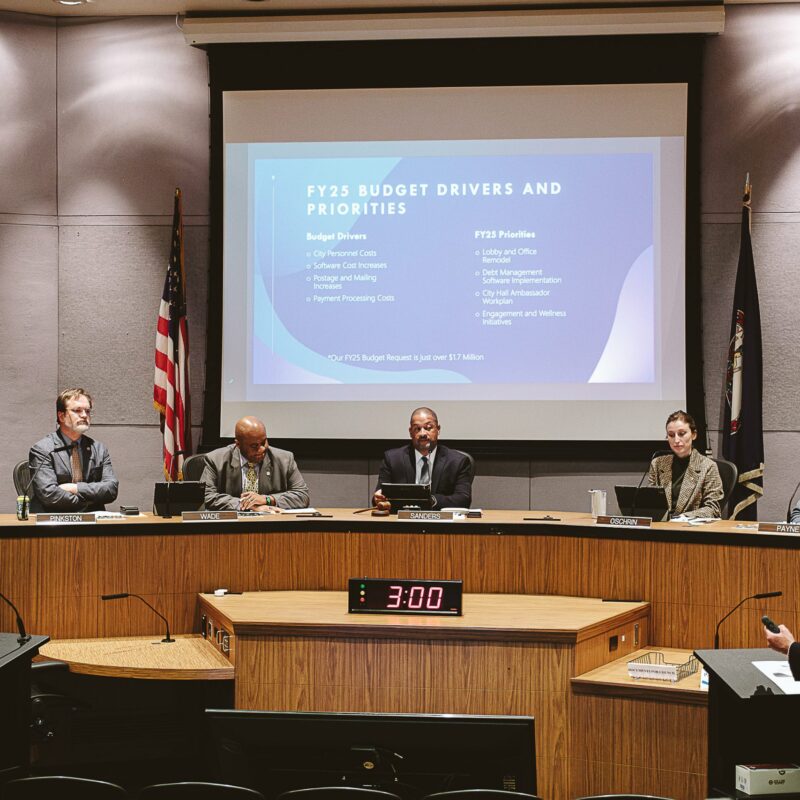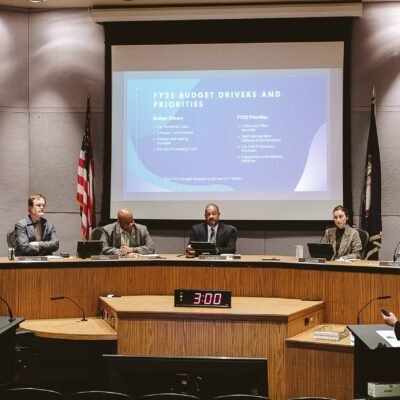On the first day of spring semester, representatives of Students and Workers United for a Living Wage met with President Teresa Sullivan to discuss fair wages for all University employees.
|
UVA English Professor Susan Fraiman helped launch the UVA living wage campaign in 1998. “The fact that we are still fighting this battle some 13 years later is discouraging,” she tells C-VILLE. |
“I was grateful that she agreed to meet with us,” says UVA English Professor and longtime living wage activist Susan Fraiman. “It was definitely a positive step that we were all in the same room talking about a living wage.” However, adds Fraiman, “I was a bit disappointed with her response.” The campaign is asking the University Administration to pay its employees $11.44 an hour —the same wage paid to City of Charlottesville employees. UVA’s minimum hourly wage is currently $10.14.
The meeting took place before Governor Bob McDonnell’s pension reform bill was killed by the state Senate Finance Reform Committee. The bill proposed that state workers contribute more of their wages to the Virginia Retirement System. In Madison, Wisconsin, thousands of city employees and teachers gathered at the capitol to protest a similar pension increase—one of several steps proposed by Governor Scott Walker to close a $3.6 billion budget shortfall.
“[UVA administrators] were very concerned that wages were going to be cut by Governor McDonnell, and they were just going to be working to keep people and make sure wages wouldn’t go down,” says UVA student and campaign member Greg Casar.
Casar adds that Sullivan seemed “careful not to say that she sympathized with us.” Fraiman, who is also a member of the Faculty Support Committee for a Living Wage, felt Sullivan wasn’t “particularly forthcoming.”
The living wage campaign also wants administrators to reduce job outsourcing to private companies. “The administration is rightly proud of its benefit packages for employees, and also stresses the existence of various training programs,” says Fraiman. “But none of this matters if an increasing number of jobs are being filled by contract workers to whom these benefits and programs don’t apply.” Fraiman adds that some contract workers are paid even less than University staff.
Casar tells C-VILLE that the campaign is ready to send Sullivan a letter asking her to “audit the contracting companies that work at UVA” with the hope that, during a March meeting, Sullivan will be able to address all their concerns.
If the efforts to get all UVA employees a living wage are sustained over time, believes Casar, administrators “will see that this is a priority issue.” This week, a group called EngageUVA will host four flash seminars—90-minute classes open to the community—on the history of the living wage movement at UVA and its connections to racial justice issues. Fraiman will teach one seminar with professors Chip Tucker and Eric Lott, who helped launch the living wage campaign in 1998.
“The fact that we are still fighting this battle some 13 years later is discouraging,” she says. (The seminar schedule is available at www.flashsems.com.) Yet, Fraiman believes that previous campaign efforts have yielded improved wages for UVA workers and a living wage in the city. One year after the living wage campaign first began, City Council raised its base pay for Charlottesville employees to $8 from $6.37 in 1999. April 15 marks the UVA campaign’s 13th anniversary, and the fifth anniversary of a 2006 sit-in that ended with the arrest of 17 students. Fraiman says there is a possibility of a “commemorative event to mark these activist high points.”
/Fraiman.jpg)





